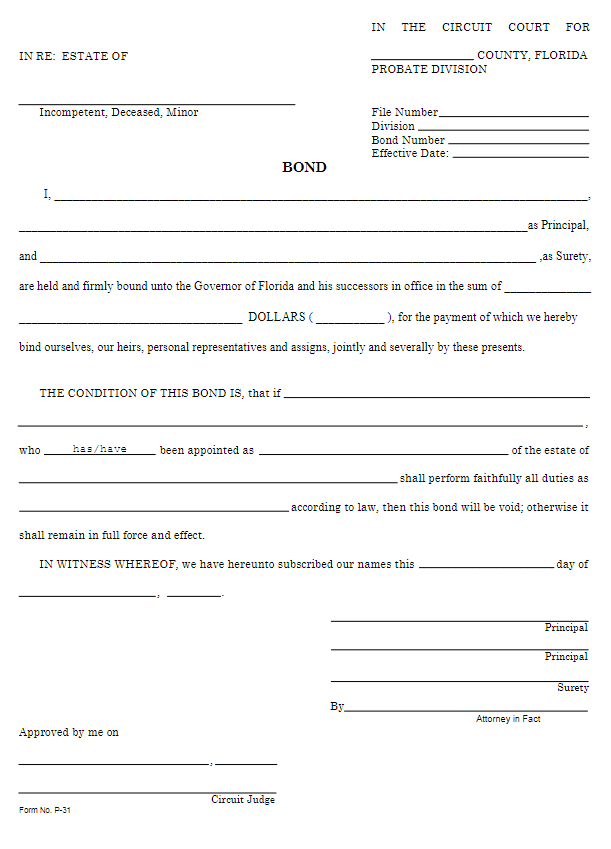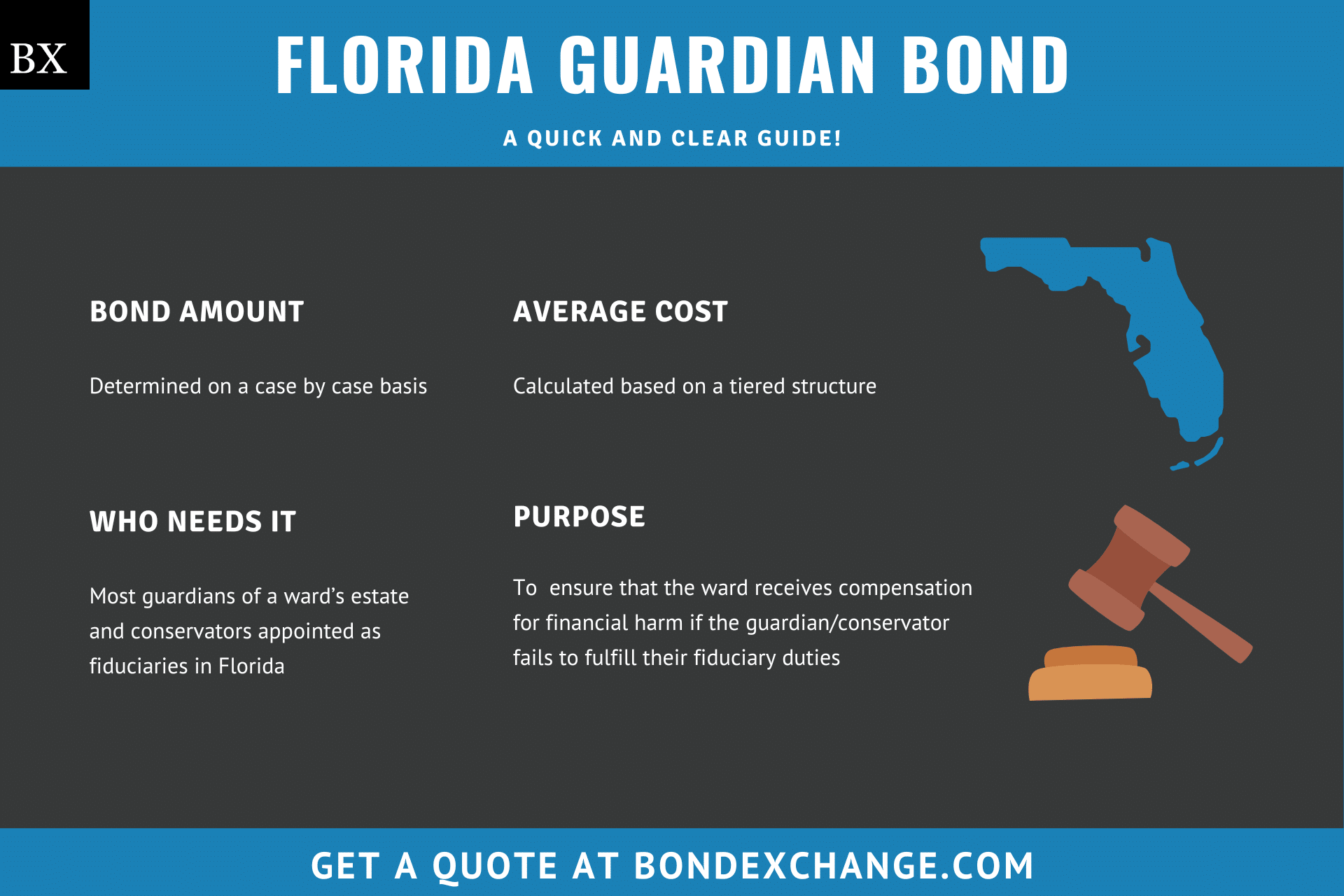Florida Guardian Bond: A Comprehensive Guide
At a Glance:
- Average Cost: Calculated based on a tiered structure
- Bond Amount: Determined on a case-by-case basis (more on this later)
- Who Needs It: Most guardians of a ward’s estate and conservators appointed as fiduciaries in Florida
- Purpose: To ensure the ward receives compensation for financial harm if the guardian/conservator fails to fulfill their fiduciary duties
- Who Regulates Guardian Bonds in Florida: The circuit court with jurisdiction over where the ward resides or has property

Florida Guardian Bond Form
Background
Florida Statutes 744.347 and 747.033 requires all guardians and conservators to be appointed by a court and swear an oath before assuming their fiduciary duties. The Florida legislature enacted the appointment requirement to ensure guardians and conservators act in the ward’s best interests when making decisions related to their health or managing their estate. To provide financial security for the enforcement of this requirement, most guardians and conservators must purchase and maintain a probate surety bond before becoming appointed as a fiduciary.
What is the Purpose of the Florida Guardian Bond?
Florida requires most guardians and conservators to purchase a surety bond as a prerequisite to being appointed as a fiduciary over a ward’s estate. The bond ensures that the ward will receive compensation for financial harm if the guardian fails to abide by the regulations outlined in Florida Statute 744.351 and 747.034. Specifically, the bond protects the ward if the guardian/conservator fails to adhere to all court orders or mishandles the ward’s assets.
For example, if a guardian uses money from a ward’s bank account to pay for the guardian’s personal expenses or mixes the ward’s funds with their own, the ward can file a claim against the guardian’s bond to recoup their losses. In short, the bond is a type of insurance in favor of the ward if the guardian or conservator does not fulfill their fiduciary duties.
How Can an Insurance Agent Obtain a Florida Guardian Bond?
BondExchange makes obtaining a Florida Guardian bond easy. Simply log-in to your account and use our keyword search to find the “Guardian” bond in our database. Don’t have a login? Gain access now and let us help you satisfy your customers’ needs. Our friendly underwriting staff is available by phone (800) 438-1162, email or chat from 7:30 AM to 7:00 PM EST to assist you.
At BondExchange, our 40 years of experience, leading technology, and access to markets ensures that we have the knowledge and resources to provide your clients with fast and friendly service whether obtaining quotes or issuing bonds.
Not an agent? Then let us pair you with one!
Click the above image to find a BX Agent near you
How is the Bond Amount Determined?
Florida Statute 744.351 dictates that the bond amount must be at least the aggregate value of all cash, securities, and personal property under the guardian/conservator’s control. The bond amount may be reduced by the value of any personal property deposited with a designated financial institution.
Can the Bond Amount be Adjusted?
Yes, as Florida Statute 744.351 dictates that the court may increase or reduce the required bond amount if they determine that doing so is justified.
What are the Underwriting Requirements for the Florida Guardian Bond?
Most surety companies will examine the following factors when determining eligibility for the Florida Guardian bond:
- Fiduciary’s credit history
- Whether or not the estate has an attorney
- Whether or not the fiduciary is a family member
- The fiduciary’s occupation
- Whether or not the guardian or conservator is replacing a prior fiduciary
- If the fiduciary has ever committed a felony
- Whether or not there is any ongoing business in the estate
- If a creditor is requiring the bond
- If the bond amount is greater than or equal to the estate’s value
How Much Does the Florida Guardian Bond Cost?
Surety companies typically determine the premium rate for Guardian bonds based on a tiered structure, so larger bond amounts will be charged a lower premium rate than smaller bonds.
The following table illustrates the pricing structure for the Florida Guardian bond:
$1,500,000 Guardian Bond Cost
| Bond Amount | Premium Rate | Total Bond Cost |
|---|---|---|
| First $20,000 | 0.75% | $150 |
| Next $40,000 | 0.60% | $240 |
| Next $140,000 | 0.50% | $700 |
| Next $300,000 | 0.375% | $1,125 |
| Next $1,000,000 | 0.25% | $2,500 |
| Total cost of $4,715 |
Who is Required to Purchase the Bond?
Florida requires most guardians and conservators with decision-making authority over a ward’s estate to purchase a surety bond as a prerequisite to becoming a court-appointed fiduciary. To paraphrase Florida Statute 744.102, a “guardian” is a person appointed as a fiduciary over a ward’s personal care and/or estate. Likewise, a “conservator” is defined as a person appointed as a fiduciary to manage the estate of someone who has died or disappeared unexpectedly, commonly known as an absentee. Additionally, a “ward” is defined as a minor or adult that is incapable of making sound decisions concerning their estate and/or personal care.
Conservators are required to purchase a bond unless specifically directed otherwise by the court. Guardians are not required to purchase a bond if they are a:
- Public guardian appointed by the state
- Guardian for the ward’s person only and not the estate
- National banking association
- Savings and loan association authorized to conduct trust business in Florida
- Title insurance company (excluding licensed family trust companies)

How do Florida Guardians Become Appointed as Fiduciaries?
Guardians and conservators in Florida must navigate several steps to become appointed as fiduciaries. Below are the general guidelines for guardians of a minor’s estate and conservators, but appointees should refer to the appointment statutes or the Office of the State Courts Administrators’ website for details on the process.
Guardian of a Ward’s Estate
Step 1 – Meet the Qualifications
Persons are ineligible for appointment as a guardian if they:
-
- Have been convicted of a felony
- Have a proven history of child abuse or neglect
- Are incapacitated or incapable of performing a guardian’s duties
- Have been found guilty, pled guilty, or entered a plea of no contest
Step 2 – Hire an Attorney
Although not explicitly required, it is highly recommended that guardians hire an attorney to assist with the appointment process.
Step 3 – File All Required Forms
Persons seeking guardianship over a ward must file multiple forms with the circuit court with jurisdiction over where the ward resides or has property. Guardians can obtain the forms online here or from the circuit court handling the case.
Once the petition is filed, the court will appoint an examining committee that will conduct an evaluation of the ward and submit a report which will be used as evidence in the hearing (more on this in Step 5).
Step 4 – Notify the Appropriate Parties
After submitting a petition for appointment to the court, persons seeking guardianship must have another adult, known as a server, notify the following parties in person:
-
- The ward
- The ward’s attorney if they have one
- Any court-appointed guardian of the ward
- The ward’s next of kin
- The parents of the ward (for guardianships over minors only)
- Any other person determined by the court
Step 5 – Attend a Hearing
Guardians must attend a hearing conducted by the circuit court with jurisdiction over where the ward resides and present evidence as to why they are in need of guardianship. The court will examine the evidence presented by the guardian as well as that presented by the minor being evaluated (if any) and make a determination as to whether or not guardianship is necessary. The court may also require the guardian to undergo a criminal and credit history check.
Any interested person can apply to the court to participate in the hearing. If the court finds a basis for the appointment, it will issue a letter of guardianship to the petitioner.
Step 6 – Purchase a Surety Bond
Unless otherwise exempt, guardians must purchase and maintain a surety bond (limits outlined above).
Conservators
Step 1 – Hire an Attorney
Although not explicitly required, it is highly recommended that conservators hire an attorney to assist with the appointment process.
Step 2 – File All Required Forms
Persons seeking a conservatorship over an absentee must file a petition for appointment with the circuit court with jurisdiction over where the absentee resided or had property. An absentee is any person who meets one of the following criteria:
-
- A person serving in the United States military who has been reported as missing in action, interned in a neutral country, beleaguered, besieged, or captured by the enemy
- Any legal resident of Florida who has gone missing or is presumed dead
Conservators can obtain the petition from the circuit court handling the case and must also provide information on the absentee’s will or any estate assets.
Step 3 – Notify the Appropriate Parties
After filing the petition with the court, persons seeking conservatorship must notify the interested parties involved in the case. This will typically be all persons named in the petition for appointment, and notices can be served via mail.
Step 4 – Attend a Hearing
Conservators must attend a hearing conducted by the circuit court with jurisdiction over where the absentee resided or had property to determine if a conservatorship is necessary. The court will examine the evidence presented by the conservator and make a determination as to whether or not conservatorship is necessary.
Any interested person can apply to the court to participate in the hearing. If the court finds a basis for the appointment, it will issue a letter of conservatorship to the petitioner.
Step 5 – Purchase a Surety Bond
Unless otherwise exempt, conservators must purchase and maintain a surety bond (limits outlined above).
How do Florida Guardians File Their Bonds?
Guardians and conservators should submit their completed bond forms, including the power of attorney, to the clerk of the circuit court with jurisdiction over where the ward resides or has property.
The surety bond requires signatures from the company that issues the bond, the applicant, and the circuit judge handling the case. The surety company should include the following information on the bond form:
- Legal name of the entity/individual(s) buying the bond
- Surety company’s name
- Legal name of the ward
- Type of fiduciary relationship
- Bond amount
- Date the bond is signed
- Date the bond goes into effect
What can Florida Guardians do to Avoid Claims Made Against Their Bonds?
To avoid claims against their bonds, guardians and conservators in Florida must ensure that they:
- Perform all of their fiduciary duties
- Obey all court orders
- Do not mismanage the estate’s assets

